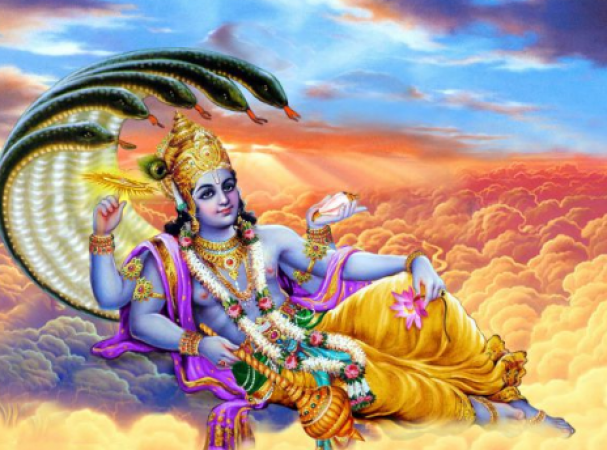
Lord Vishnu, one of the principal deities in Hinduism, is revered as the preserver and protector of the universe. His rich history, profound mythology, and divine attributes have captivated devotees for centuries. This article explores the fascinating history of Lord Vishnu, highlights some of the famous Vishnu temples, elucidates the worship rituals associated with him, and provides insights into the sacred rules that should be followed when worshiping this revered deity.
History of Lord Vishnu:
Lord Vishnu, considered the second member of the Hindu Trimurti (trinity), has an illustrious history that is deeply rooted in Hindu mythology. He is believed to have descended to Earth in various incarnations, known as avatars, to restore balance and righteousness whenever the world is threatened by evil forces. Some of his famous avatars include Lord Rama, Lord Krishna, and Lord Narasimha.
The origins of Lord Vishnu can be traced back to the ancient texts of Hinduism, such as the Rigveda and the Upanishads. These texts depict Vishnu as a benevolent deity with cosmic attributes, often associated with the preservation and maintenance of the universe. As the supreme deity, Vishnu is depicted as having a serene complexion, adorned with divine weapons, and accompanied by his consort, Goddess Lakshmi.
Famous Temples Dedicated to Lord Vishnu:
Lord Vishnu is worshipped in numerous temples across India and other parts of the world. These temples not only serve as places of religious significance but also stand as architectural marvels. Some of the renowned Vishnu temples include:
Tirupati Balaji Temple, Andhra Pradesh, India:
Situated in the Tirumala hills, the Tirupati Balaji Temple is one of the most visited and revered Hindu temples. It is dedicated to Lord Venkateswara, an incarnation of Lord Vishnu. Devotees from all over the world flock to this temple to seek the blessings of the Lord and participate in various rituals.
Vaikuntha Perumal Temple, Kanchipuram, Tamil Nadu, India:
The Vaikuntha Perumal Temple, located in Kanchipuram, is an ancient temple dedicated to Lord Vishnu. It is known for its architectural splendor, intricate carvings, and sculptures that depict scenes from Hindu mythology. The temple is an important pilgrimage site for Vaishnavites.
Angkor Wat, Cambodia:
Although primarily a Buddhist temple complex, Angkor Wat also houses Hindu deities, including Lord Vishnu. The temple's exquisite architecture and the famous Vishnu sculpture known as the "Churning of the Ocean of Milk" attract tourists and spiritual seekers alike.
Worship Rituals for Lord Vishnu:
Worshiping Lord Vishnu involves performing various rituals with devotion and sincerity. While the specific rituals may vary from region to region, there are some common practices followed by devotees. Here are the key elements of worship:
Purification: Before worshiping Lord Vishnu, it is essential to cleanse oneself physically and mentally. Devotees often take a ritual bath or sprinkle water on their bodies as a symbolic act of purification.
Offerings: Offerings play a crucial role in worshiping Lord Vishnu. Devotees typically present flowers, fruits, incense, and sacred items such as sandalwood paste and vermilion to the deity. These offerings are made with deep reverence and devotion.
Mantras and Chants: Reciting Vishnu mantras and chants is an integral part of worship. The most famous mantra associated with Lord Vishnu is the "Om Namo Narayanaya" mantra. Chanting these mantras is believed to invoke the divine presence of Lord Vishnu.
Arti and Bhajans:
Arti, a devotional ritual involving the waving of a lamp in front of the deity, is performed with utmost devotion. Singing bhajans (devotional songs) praising Lord Vishnu is another way to express devotion and seek his blessings.
Meditation and Prayer: Devotees often engage in meditation and prayer as a means of connecting with Lord Vishnu at a deeper level. This practice helps in focusing the mind and surrendering oneself to the divine presence of the Lord.
Sacred Rules to Follow: When worshiping Lord Vishnu, certain sacred rules and customs should be observed to show reverence and respect. These rules may vary based on cultural and regional practices, but here are some common guidelines:
Purity: Maintaining purity, both physical and mental, is of utmost importance. Devotees should ensure that they are clean and free from any impurities before entering the temple or engaging in worship.
Dress Code: Temples often have specific dress codes that need to be followed. Generally, modest attire that covers the shoulders and legs is recommended. Wearing clean clothes and removing footwear before entering the sanctum is considered a sign of respect.
Silence and Respect: Inside the temple premises, maintaining silence and showing respect to fellow devotees, priests, and the deity is essential. Loud conversations, disruptive behavior, and any form of disrespect should be avoided.
Observing Fasting: Observing fasting on auspicious days dedicated to Lord Vishnu is considered highly meritorious. Devotees may choose to fast from sunrise to sunset or abstain from specific foods. Fasting is believed to purify the mind and enhance spiritual connection.
Lord Vishnu, with his divine incarnations and benevolent nature, holds a significant place in Hindu mythology and worship. His history is deeply intertwined with the cultural and spiritual fabric of India and beyond. By visiting the famous Vishnu temples, understanding and following the worship rituals, and observing the sacred rules, devotees can deepen their connection with Lord Vishnu and seek his blessings for a fulfilling life. May the devotion to Lord Vishnu inspire us to uphold righteousness, peace, and harmony in the world.
The Impact of Article 370 on Dalits: Examining Challenges and Concerns
You must know these things before undertaking the Amarnath Yatra in the month of Sawan
Swami Vivekananda: The world is the gymnasium of character formation